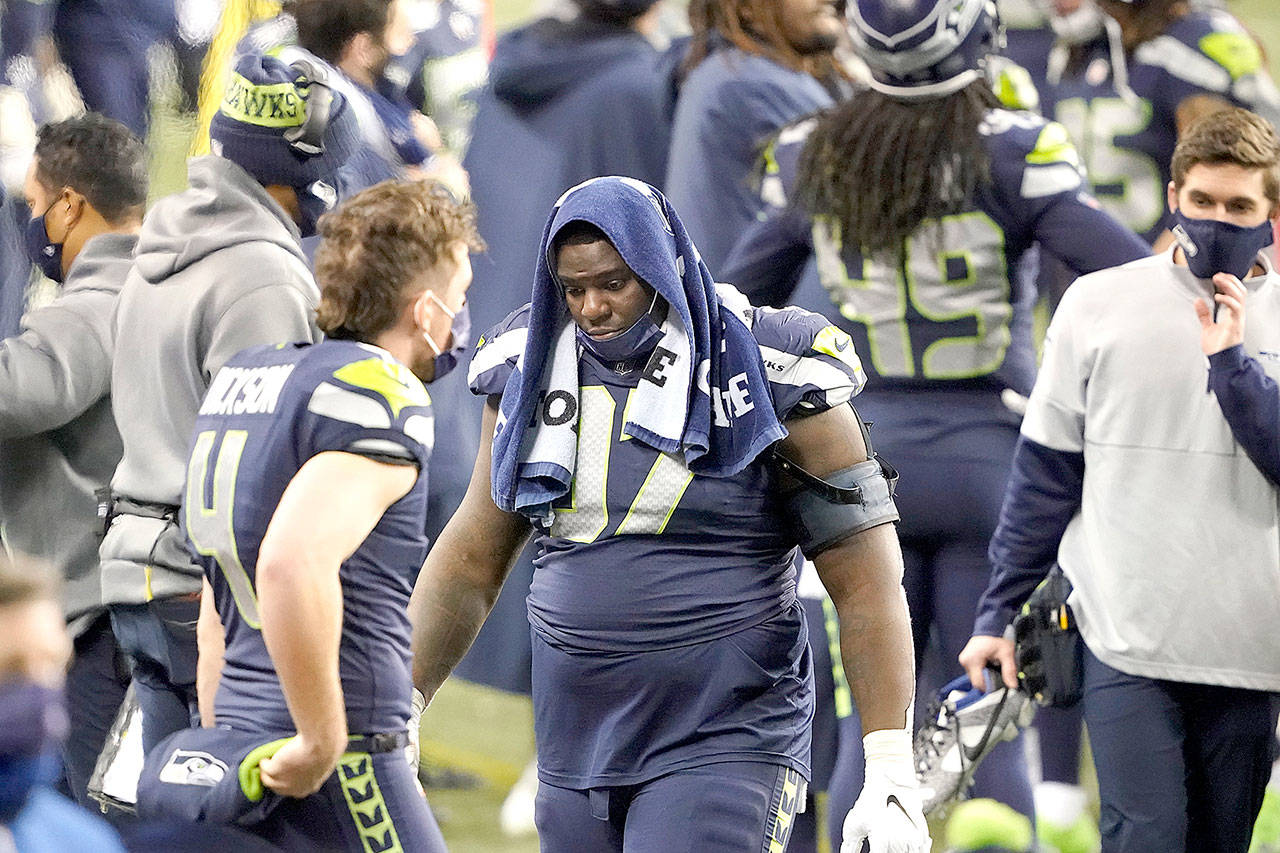SEATTLE — Russell Wilson took almost two hours following the game to speak publicly.
But this time, he wasn’t wearing a designer, custom suit. He had on a baggy team hoodie, so overly large it didn’t appear to be his. Instead of perfectly gelled and coiffed hair, it was, for him, disheveled. Unruly, almost, onto his forehead.
He sounded as he looked: dejected.
“We were kind of flat-lined,” Wilson said of his and the Seahawks’ worst game with the highest stakes, their 30-20 loss to the dominant Los Angeles Rams that wasn’t that close Saturday in the NFC wild-card playoffs at emptier, quieter-than-ever Lumen Field.
“We didn’t play great today. I think that was the unfortunate part about it,” Wilson said. “The real unfortunate part is, that’s it. End of the season. After all this time of putting in all the hard work in and everything else and how spectacular the season has been along the way.
“It’s unfortunate we didn’t get it done for the 12s and everything else.”
What they didn’t get done is what did them in over the final half of the 2020 season.
At midseason Wilson was a candidate to be the NFL’s most valuable player. The offense was leading the league in yards passing and points. DK Metcalf was the sport’s leading receiver in yards. Wilson was repeatedly launching home-run balls like he was Babe Ruth.
Then defenses caught up to Seattle’s ways. Instead of single-high safety coverage and cornerbacks trying to stay with Metcalf and Tyler Lockett, teams dropped two safeties deep. They bracketed Metcalf with a cornerback in front and a safety behind. The teams that beat the Seahawks the latter half of the season — the New York Giants, the Rams (twice) — sacked and hit Wilson with pass rushes that further ruined Seattle’s deep-passing game.
Foes dared Wilson to throw shorter, quicker passes underneath the more-umbrella coverages.
The Seahawks’ and offensive coordinator Brian Schottenheimer’s fatal flaw, through Saturday’s complete malfunctioning for the first three quarters against the mashing Rams?
They never adjusted to defenses’ adjustments.
Where they failed
The Seahawks finished 12-4, won the NFC West for the first time since 2016 and won four games to close the regular season because of their defense, not because of Wilson and the formerly high-flying offense.
The defense went from worst in league history in yards passing allowed and total yards allowed — from giving up 31 points to Dallas and New England in consecutive games, a coach-Pete-Carroll-era-high 44 at Buffalo in November — to surrendering a league-low 15 points per game over the last seven games.
Wilson and the offense tried, week after week, to fit a square peg into round holes. They tried to still throw deep into defenses specifically schemed to take that, sometimes only that, away from Seattle.
“It seemed like during the course of the season, after the halfway point, we had hit so much early, we had been so effective that people found a way to stay back and just try to bleed us and make us have to throw the ball underneath,” Carroll said. “And we were maybe really going for it more than we needed to. And didn’t take advantage of switching gears a bit there, as effectively as we would like.
“I wish we would have adapted better under those circumstances.”

